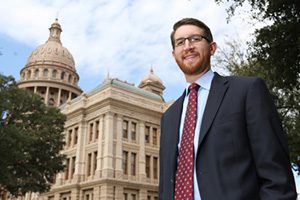WACO—Confrontation and shaming may produce temporary victories, but shared power built on mutual trust leads to sustainable solutions, the founding executive director of the Texas Hunger Initiative said.
“Ultimately, if we intend to build a system that works for all Americans regardless of their socio-economic level, we have no choice but to find our shared power,” Jeremy Everett told participants at the Together at the Table Hunger and Poverty Summit at Baylor University.
“I am convinced the uniting power and prophetic witness of sowing seeds of mutual trust, collaboration and commitment are critical to cultivating hunger-free communities in our time of contention.”
Everett reflected on what he called “the most erratic year” he could remember in his lifetime.
“Racism, classism, sexism and immigration have prominently been featured each day via social media, on news outlets or by religious leaders. What we have heard often were lies after lies—spinning stories to the point where we were all left scratching our heads as to what actually happened or hunkering down in fear,” he said.
“Impoverished immigrants fleeing violence in Central America have been front and center in our political winner-take-all battle.”

Everett contrasted that portrayal with his personal encounter with an elderly group of undocumented immigrants he met in a citizenship class when he served on the National Commission on Hunger. Most had lived and worked in the United States for much of their lives. Some had served in the military.
“They were not rapists, murderers or drug smugglers,” he said. “They had been business owners, welders and car mechanics, and their one wish was to die as Americans.”
Beyond that desire for U.S. citizenship, the other characteristic they all shared was that they experienced hunger, he recalled. Some had been injured on jobs but did not receive workman’s compensation because they were not U.S. citizens. Some had worked as field laborers or custodians, and their jobs did not provide retirement benefits.
Sign up for our weekly edition and get all our headlines in your inbox on Thursdays
Who are the hungry in the United States?
They are not alone. More than 40 million people in the United States live in poverty, including 13 million children and 4.6 million senior adults, he noted. Not coincidentally, more than 40 million Americans are considered food-insecure, including 13 million children. And more than 40 million Americans lack access to healthcare.
“Sometimes, we act as if it is a different group of 40 million Americans experiencing hunger than the 40 million without healthcare or who live in poverty. But that is not the case,” he said, “It is the same family struggling with all of these problems.
“We have scapegoated the poor to justify not living up to our calling. To scapegoat and push the poor out of our minds, we’ve had to dehumanize them. We have worked hard to classify the poor as lazy, to divide them as ‘deserving’ or ‘undeserving.’ …Thus, it becomes morally defensible for some children to have an abundance of food while others have nothing in the fridge. We can just blame the parents for being lazy or an illegal.”
Everett identified three characteristics of Americans who experience hunger:
- Underemployment. Rather than living with chronic daily hunger, most people in the United States who are hungry experience it near the end of a pay period, because they run out of groceries and cannot afford more.
“Basically, many people who are experiencing hunger have jobs and are working, but their jobs don’t pay enough to cover all of their living expenses—even when they’re putting together as many jobs as they can to try and make ends meet,” he said.
- Lack of education. “Hunger and education can quickly become a vicious cycle,” he observed. “A person needs to have an education in order to have the best chance of not living in poverty, but living in poverty is a detriment to getting an education.”
- Race and ethnicity. “People of color are almost twice as likely to experience hunger in our nation,” he said.
“Whether or not we want to admit it, we have not healed our wounds of racism. We have had our moments of triage—abolishing slavery and the Civil Rights Movement—which were critical steps to slowing the hemorrhaging flow of racist hatred, bigotry and indifference that were pervasive in our history. But we have not taken steps toward healing on a national level.”
Another consistent characteristic of many people who experience hunger is they must “make trade-offs each month,” choosing to skip meals and cut corners on groceries in order to pay other bills.
“If people don’t pay their electricity bill, their power is cut off. If they don’t pay rent, they are kicked out of their home. But if they don’t buy food, they’ll just be hungry,” he said.
“Yes, not having food leads to less productivity at work and school, increases mental health decline and causes shame, but you keep your home. So, people make tradeoffs to get by.”
Methods matter
While the poor need maximized access to public and private assistance programs, Everett insisted the way positive change is accomplished is as important as achieving success in reaching goals.
Since the poor—and those who advocate for them—lack the power that accompanies wealth or prominence in society, they often have secured power through organized action. Many times, that has taken the form of confrontation and publicly shaming people who hold decision-making power, he asserted.
However, victories gained by confrontation and shaming rather than by building consensus are limited, he insisted.
“With that approach, people who are not already on board are rarely converted to the cause of justice,” he said. “Shaming, in essence, implies that it has already been decided who is for and who is against the cause, setting up a self-righteous and self-defeating paradigm rarely resulting in compromise, much less finding common ground. And shaming almost always ensures powerful enemies to any cause the organizers later take on.”
Everett recommended a different approach—shared power earned by cultivating mutual trust.
“This is how sustainable solutions take shape, by creating shared power rather than shaming power,” he said.
“If we are going to change our country for the better, ultimately we need to say, ‘Enough is enough,’ to politics as a winner-take-all battle and instead come together to give voice to all Americans.”
Do the slow, hard work of building coalitions
Building coalitions is essential to addressing the problem of hunger, he asserted.
“I know it is cumbersome, slow and occasionally bureaucratic, but shared power leads to sustainable solutions,” he said.
“What history teaches us is how we go about change should reflect the integrity of our desired outcome. When we only channel self-righteous indignation and anger and belittle those with whom we disagree, even when they are perpetuating an injustice, we do not win in the end.”
Rather than blaming and shaming, instead of dehumanizing and denigrating, Everett called on Christians to recognize the way Christ identified with the poor and vulnerable in Matthew 25 and to “not only see the hungry as humans, but to see the hungry as Jesus.”













We seek to connect God’s story and God’s people around the world. To learn more about God’s story, click here.
Send comments and feedback to Eric Black, our editor. For comments to be published, please specify “letter to the editor.” Maximum length for publication is 300 words.